The Impact of the US Elections on the Global Economy
Understand the impact of the US elections on the global economy, the stock market and the commodities sector.
The race for the presidency of the United States has begun and the vote is scheduled for November 5, 2024. Due to its economic and political influence, the country’s decisions are of great importance. The eyes of the world’s leaders are focused on the people’s choice of the next president.
The market had already been paying close attention to the polls and the candidates’ proposals. However, with the attack on former president and poll leader Donald Trump last weekend, the developments in the US election are likely to become even more relevant.
The intense competition between the main candidates is reminiscent of historical scenarios in international politics. Tight data and polls such as these create unease in the market and can affect the price of international currencies, stocks, commodities and more. In this article we’ll look at how elections affect the global economy, data from previous election years and more. Have a good read!
World Largest Economy
Today, the United States is considered the world’s leading economy. In less than 4 centuries, the United States has grown from a colony to a global powerhouse on the strength of its industrial and agricultural production, abundant natural resources, and logistical advantages.
Today, the country leads the world in gross domestic product (GDP). According to the IMF, the United States leads with a GDP of $28.7 trillion and growth of 2.7% in 2024. Its position is isolated at the top, with China reaching US$18.53 trillion in second place.
Read also:
- The Atlantic hurricane season and its impact on the American energy sector
On the home front, further demonstrating the nation’s steady growth, US states also reported increases in GDP and personal income in Q1 2024. See below for the latest data on this continuing evolution within its borders:
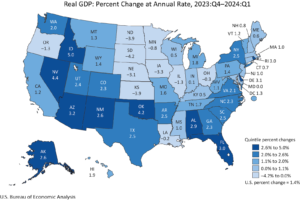
Source: US Bureau of Economic Analysis
In addition to its economic power, the United States exerts influence around the world through its many trade and humanitarian relationships. According to the Office of the United States Trade Representative (USTR), the country negotiates with more than 200 countries, territories, and regional groupings around the world. Here are some of the agency’s data on this influence:
- 2nd largest exporter of goods in the world;
- $2.1 trillion in exports in 2022;
- The world’s largest importer of goods;
- US$3.2 trillion in imports in 2022;
- World’s largest exporter of services;
- $926.0 billion in services exported in 2022;
- Largest importer of services in the world;
- $680.3 billion in imported services in 2022;
- US$45.4 billion in foreign aid for economic purposes in 2022, according to USA Facs.
Data on U.S. foreign assistance in 2022, by world region:
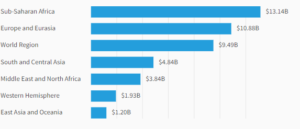
Source: USA Facs
More than just trade agreements, the influence of the United States is also strong in humanitarian relations, as shown in the table above. All regions of the planet have contact with the American nation, further highlighting the country’s relevance and power.
The influence of American elections on international trade
America’s numerous and large-scale trade relations are extremely important for the countries that have contact with the nation. In fact, the 2023 World Economic Outlook (WEO) reported that the improvement in the global economic outlook was driven, in part, by the strength of the United States.
Read also:
- What to expect from the La Niña phenomenon in 2024?
In addition, international trade depends on trade agreements, exchange rates, incentive programs and other US initiatives that move the market. All of these existing agreements could change with a change of government, proving the importance of US policy.
Another relevant point is the role of the dollar: the main currency used in international transactions and negotiations. Globally, any fluctuation in the value of the dollar can have an impact on the economy and on the prices of imported and exported products, especially in emerging countries. Hegdepoint’s blog explains why the US dollar has been the global currency benchmark since the middle of the Second World War.
The historic impact of the U.S. elections on the global economy
Before the elections
Historically, elections in the United States have generated a certain amount of volatility in the dollar. In the run-up to the elections, political uncertainty can cause the currency to fluctuate, mainly due to expectations about the results and possible policies of the presumed winning parties.
This volatility can be even greater in tighter presidential races. According to the Association of Corporate Treasurers (ACT), the dollar weakened against the pound from US$1.53 in mid-January 2012 to US$1.63 in September. Predictions of a close election between Barack Obama and Mitt Romney led to this fluctuation.
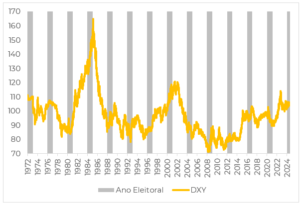
Post-Election
The dollar tends to react more strongly after election day, as the outcome will determine the behavior of stock markets and the exchange rate. In 2016, for example, Donald Trump’s victory boosted the dollar because the president had mentioned expansionary fiscal policies in his candidacy.
The rest of the world
On a global scale, a stronger dollar can also weaken the currencies of other countries. When the American currency is stronger, it can make other nations’ products and services more expensive and reduce their export competitiveness.
In addition, all of this movement in the dollar creates some volatility in the market, especially in commodity prices. Since these are international products and are usually traded in U.S. currency, the price ultimately affects their final value.
The stock market is another sector that can be affected by the value of the dollar. However, the US elections have not been as significant as expected. In recent years, the country’s financial stability has helped maintain a resilient economy, even during presidential campaigns.
Read also:
- Driving season: the impact on the North American fuel market
Avenue’s research shows that the S&P 500, the stock index of the 500 largest companies on the American stock exchanges, has regularly performed in election years. The analysis also shows that the index has continued to grow even as the parties have changed throughout history:
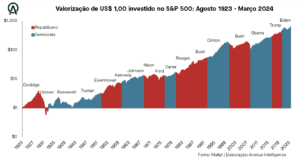
Source: Avenue.us
Another study, this time by Blackrock, shows that election years have been positive for the stock market. The graph below shows this behavior:
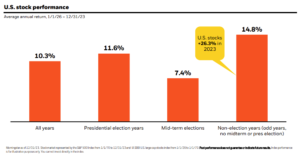
Source: Blackrock
The same study shows that the elections themselves don’t have that much impact on the economy. What really makes the biggest difference in the international market is the price of the dollar, market supply and demand, the political and fiscal programs that the new president will implement, and more. Here are a few examples of what has most affected the market in recent American election years:
- 2008: The U.S. housing crisis was the main factor causing volatility in the market at the time;
- 2012: The dollar suffered from price fluctuations, but the Federal Reserve’s expansionary monetary policy had a greater impact on the market than the election;
- 2016: A year of significant pre-election volatility, but the dollar strengthened due to policies announced by the president-elect;
- 2020: The market suffers mainly from the pandemic and its impact on the global economy.
How to manage risk in a volatile scenario
As presented in this text, there are several factors that affect the global economic market and the prices of stocks and commodities traded globally. At Hegdepoint, we work with hedging instruments that aim to reduce the financial risks that these variables can cause in product values.
Using advanced tools, our professionals study the market and evaluate each influential factor in the commodities, currencies and energy sectors. Contact us to learn more about how we can help your business.






